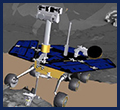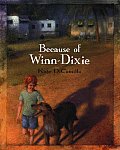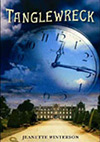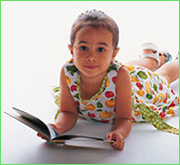News Of Yesterweeks
Kids love to Cook!
Posted March 18, 2008: Kids do find cooking fun. Reading about it isn't bad either. We recommend two wonderfully creative picture books, The Princess and the Pizza by Mary Jane and Herm Auch in a many-leveled tangled tale involving pizza and the princess who slept on a pea.
Another food-related story, SunBread by Elisa Kleven, draws us into a poetic vision about the sun's warmth, home-baked bread, and changing moods.
Did You Vote Yet!
Posted Feb. 7, 2008: Not unless you are 18, but you are not too young to learn the importance of elections. In the United States,  we are preparing to vote in a new president. A big group of people decided to try for the job. So now we are having a lot of little elections, called primaries, to decide which two people should run. Then we are going to decide between them in November. Why don't you ask your family members who they want to win? And if you want to get in an election mood, read Eileen Christelow's Vote!, Doreen Cronin's Duck for President, and Max for President by Jarrett J. Krosoczka .Supplement all that reading with a stop at this PBS web site, called Kids Democracy Project and try your hand at being President for a day.
we are preparing to vote in a new president. A big group of people decided to try for the job. So now we are having a lot of little elections, called primaries, to decide which two people should run. Then we are going to decide between them in November. Why don't you ask your family members who they want to win? And if you want to get in an election mood, read Eileen Christelow's Vote!, Doreen Cronin's Duck for President, and Max for President by Jarrett J. Krosoczka .Supplement all that reading with a stop at this PBS web site, called Kids Democracy Project and try your hand at being President for a day.
Amazing Computers
Posted Jan. 30, 2008: They are amazing! Now don't you yawn. You don't know everything about computers -- just because you can play a zillion games, look up your grades  on your school account, and show Mom how to get pictures off Google. Bet I can show you something new. Right-click this page right now. The mouse. Press the right side, not the left. Now click "View Source." See it? Code. HTML. XML. CSS. Crivens, as the Wee Free Men would say, don't you want to learn to write that? No. Okay, then read about it. The best computer adventures include Susan Cooper's "The Boggart" in which an ancient monster travels through the computer to...And another great computer-based plot can be found in the sequel to a Great Good Thing by Roderick Townley. The sequel is called Into the Labyrinth.
on your school account, and show Mom how to get pictures off Google. Bet I can show you something new. Right-click this page right now. The mouse. Press the right side, not the left. Now click "View Source." See it? Code. HTML. XML. CSS. Crivens, as the Wee Free Men would say, don't you want to learn to write that? No. Okay, then read about it. The best computer adventures include Susan Cooper's "The Boggart" in which an ancient monster travels through the computer to...And another great computer-based plot can be found in the sequel to a Great Good Thing by Roderick Townley. The sequel is called Into the Labyrinth.
P.S. Try clicking the little orange square in the corner of this site. Now you can tell your teacher you read XML today...
Rushing Water!
Posted Jan. 21, 2008: Rivers! The rushing waters criss-cross our land, pouring over water falls, gliding peacefully in mountain valleys, sometimes spilling banks, and offering wet and reedy homes to many a river otter. The Yangtze River is in China, the Amazon is in Brazil. Do you know the name of the Niagra Falls river?
Meanwhile, visit some rivers through books: Letting Swift River Go by Jane Yolen is about the damming of a river in Boston to form a reservoir of drinking water.
Young reluctant boy readers might enjoy Hank Zipzer's Niagra Falls, or Does it?.
Lyddie by Katherine Paterson is a novel about women mill workers and illustrates how a river provides a livelihood. And older girls could try Patricia Curtis Pfisch's Riding the Flume, a scary adventure involving the rushing waters that drove the west coast logging industry.
Codes
Posted Jan. 13, 2008: Codes, forms of secret communication, often use symbols or letter patterns to disguise a message. The technology, called cryptology, has been around since writing was invented thousands of years ago. Today, the practice is used by governments, military, businesses, and organizations to protect their messages. And by kids.
Some books that travel this path? Well, "Do Not Open" by John Farndon is a great place to start. A few fiction books that touch upon the practice of cryptology (codes and ciphers) are Artemis Fowl: The Eternity Code by Eoin Colfer, Alvin's Secret Code by Clifford Hicks, and The Mysterious Benedict Society by Trenton Lee Stewart. Interested? Visit the National Security Agency's Kids Cryptology web site
Cold Toes and Teddy Bears!
Posted Nov. 25, 2007: Have you ever had cold feet? Well, you most certainly would in a hotel in Jukkasjarvi, Sweden. It is made entirely of ice. They build it each November and customers come to stay until it melts in the Spring. The structure has 60 rooms, a cinema, and even electrical plugs for  computers. But no hair dryers allowed! Want to read about a cold place? Try Jan Brett's new "The Three Snow Bears." She was inspired after visiting northern Canada and seeing native art of Arctic animals in Inuit clothing.
computers. But no hair dryers allowed! Want to read about a cold place? Try Jan Brett's new "The Three Snow Bears." She was inspired after visiting northern Canada and seeing native art of Arctic animals in Inuit clothing.
Read our new lesson plan here.
Music...Classical!
Posted Oct. 22, 2007: Beethoven was so particular about his coffee, legend holds he would count out every bean to make it. Prokofiev was once evicted for playing one chord 218 times. Mozart interrupted his own concert before a queen to  chase a passing cat.
If you play an instrument, you already know it is much more fun to know about the lives of those 300-year-old composers. There's lots of books on the subject. Try: "Lives of the Musicians" by Kathleen Krull.
chase a passing cat.
If you play an instrument, you already know it is much more fun to know about the lives of those 300-year-old composers. There's lots of books on the subject. Try: "Lives of the Musicians" by Kathleen Krull.
Animals at Work
Posted Dec. 5, 2007: Animals are fun, aren't they? Cuddly, playful, frie ndly -- most. But they also work. In many places, people depend on animals instead of vehicles. Water buffaloes, for instance, make rice farming possible. Camels journey through shifting desert sands, with their dinner-plate feet and thick eyelashes, carrying cargo. In Greece, no one can climb the steep volcanic islands without the help of surefooted donkeys. But what about the work of a pet -- bringing you joy, comfort and learning. Read "Because of Winn-Dixie" by Kate DiCamillo to learn how a dog helps a troubled little girl learn to forgive.
ndly -- most. But they also work. In many places, people depend on animals instead of vehicles. Water buffaloes, for instance, make rice farming possible. Camels journey through shifting desert sands, with their dinner-plate feet and thick eyelashes, carrying cargo. In Greece, no one can climb the steep volcanic islands without the help of surefooted donkeys. But what about the work of a pet -- bringing you joy, comfort and learning. Read "Because of Winn-Dixie" by Kate DiCamillo to learn how a dog helps a troubled little girl learn to forgive.
Grow Your Brain!
Did you know you can make yourself smarter? Sure, says  Stanford college professor Carol Dweck. Your brain is like a muscle -- exercise it and it will grow stronger. That might sound simple, but it's a new idea to people who think someone is born with a certain amount of smarts and that's that. So, get exercising. Start with "The Number Devil" by Hans Magnus Enzensberger.
Stanford college professor Carol Dweck. Your brain is like a muscle -- exercise it and it will grow stronger. That might sound simple, but it's a new idea to people who think someone is born with a certain amount of smarts and that's that. So, get exercising. Start with "The Number Devil" by Hans Magnus Enzensberger.
Best of 2007!
Just a smattering of the last year's books that we believe deserve recognition AND reading:
"Do Not Open" by John Farndon; Redwall: EULALIA! by Brian Jacques; Harry Potter #7; Septimus Heap: Physik by Angie Sage; The Sweet Far Thing by Libba Bray; The Sisters Grim: Magic and Other Misdemeanors; Trouble According to Humphrey by Betty Birney; The Fairy Chronicles: Mimosa and the River of Wisdom; The Ghost Sonata by Jennifer Allison.
Zone In To Time
Posted Nov. 22, 2007:
History has seen many time-reading devi ces. Sundial, candle, stones, and sand -- to name a few. Have you ever visited Stonehenge in England? That's a collection of stone slabs arrange in a circle and at odd angles. Though their reason for existence is still a mystery, most experts think they had something to do with time. Interested in time manipulation? Read "Tanglewreck" by Jeanette Winterson. Want a novel with shades of Stonehenge? Try "Over Sea, Under Stone" by Susan Cooper.
ces. Sundial, candle, stones, and sand -- to name a few. Have you ever visited Stonehenge in England? That's a collection of stone slabs arrange in a circle and at odd angles. Though their reason for existence is still a mystery, most experts think they had something to do with time. Interested in time manipulation? Read "Tanglewreck" by Jeanette Winterson. Want a novel with shades of Stonehenge? Try "Over Sea, Under Stone" by Susan Cooper.
A Tidal Wave is Coming!
Posted Nov. 19, 2007: We've been busy like you, battling nefarious creatures and breaking magical charms, but now we intend to direct our energy into new stories, and trivia and reviews - a tidal wave of new stuff. Watch this site Thanksgiving Weekend and have a great reading-kind-of holiday! And you might want to try out our review on: "The Name of this Book is Secret". It is, you know.
And Now There are Eight
Posted Nov. 4, 2007: Did You know that Pluto is no longer a planet? Yes, it happened last August, but perhaps that was when you were young and weren't old enough to understand such things. To be sure, there are plenty of books in the science section of your library that still say we have nine planets. Maybe you even own such a book.
Well, the sad truth is that we now really only have eight planets. Last summer, scientists decided that Pluto's small size - less than one-fifth the diameter of Earth - and its odd tilted orbit - that takes it inside Neptune every couple of hundred years - make it unworthy to be called a planet.
On August 24, 2006, the International Astronomical Union passed a new definition of planet that excludes Pluto and puts it in a new category of "dwarf planet."
Pluto was discovered in 1930 as a result of an extensive search by astronomer Clyde Tombaugh. What would Mr. Tombaugh say today?
We Won a Web Award
Posted Oct. 15, 2007: Kids Reading Circle won the Interactive Media Award for Outstanding Achievement in the Kids category. Visit our Awards Gallery . Read our Press Release.
They Found a Dinosaur!
Posted Oct. 11, 2007: Footprint, that is. Still, isn't that cool? A fossil researcher (paleontologist) has discovered a giant footprint in Montana. And he thinks it was left by a three-story high tyrannosaur that lived 65 million years ago. The footprint is about 2 and 1/2 feet long. "We are relatively confident that it's been made by a theropod, or predatory dinosaur," said paleontologist Phillip Manning of the University of Manchester in England, who was part of the team that found the print. Though the researcher believes it was a T-rex, he admitted that it could have been made by a species of dinosaur that is new to science. Read entire article here....
You Like Science Books!
Posted Oct. 11, 2007: Publishers say so, anyway. Statistics show science is one of the fastest growing topics for kids books these days. Is this true for you? Do you like the pictures in Peter Sis' books, or the drama of storms in Seymor Simon's photographic journeys. Have you ever taken that journey through a baking cake with Ms. Frizzle and the Magic School Bus? In the coming weeks, we are planning a big project on science books, both fiction and non-fiction, right here. So watch this spot..Look for a big “Sci” circle.
Posted Oct. 23, 2007: Poi Pourri
- The opposite sides of a dice cube always add up to seven.
- A grown cat can run 12 miles per hour.
- The first pencil was a collection of "graphite" sticks held together by string. Then someone decided to stuff them into a hollow wooden stick.
- The average lead pencil can draw a line that is almost 35 miles long, and can produce nearly 30,000 words in English?
- You've Got to visit this fun site!! It's Here. Your computer screen will fill with Tiny Mechanics at Work. Music opens with this site, so you might want to turn down your computer's volume in case someone nearby is sleeping.
- And don't forget to check our new review of The Castle Corona by Sharon Creech.
Current Affairs are Good, too
Posted Oct. 19, 2007: This week we are recommending some readable adult fare to our young adult readers. The 2008 Campaign is heating up and it is good to inform them while they are young.  The book we recommend today is causing a current affairs buzz. "State of the Unions" by Philip Dine, a Washington journalist who offers an intelligent, readable look at the rise and fall and potential rebirth of labor unions and what this all means to the U.S. economy. Could be heavy reading, but it's not. Just look at the praise by Mike Wallace on the book's cover.
The book we recommend today is causing a current affairs buzz. "State of the Unions" by Philip Dine, a Washington journalist who offers an intelligent, readable look at the rise and fall and potential rebirth of labor unions and what this all means to the U.S. economy. Could be heavy reading, but it's not. Just look at the praise by Mike Wallace on the book's cover.
Are Your Parents Reading?
Posted Sept. 24, 2007: Do you like reading? Maybe you need to turn your parents on to it. According to a recent news article, there are lots of adults are not reading. One in 4 adults, in fact, didn't read a single book last year, according to a recent poll.
There is some good news. More books were sold last year than the year before, according to the nation's book industry. If you and your parents want to read the entire Poll story, it is here.
Meanwhile kids, do you have any titles you can recommend to your parents? My own daughter just handed me Permanent Rose by Hillary McKay. And she gave me a deadline...so I have to go read now.
Banned Book Week
Posted Sept. 24, 2007: Hey kids, Banned Book Week is coming up. Know what that is? It's an awareness event that the American Library Association and other groups hold to stop people from banning books. You might have heard of a children's book or two that is on the “banned” list. This just means that somewhere in the country, someone thought this title ought not be read by children. Maybe the arguer thinks the book has a bad word or offensive idea. The person then will try to make the book unavailable to libraries and schools where the arguer lives. The country is a big place. If you see a favorite book on a “banned” list, it's probable that the title is being banned somewhere far away.
Here is a partial list of books banned in some places. Some of the titles may surprise you:
- Harry Potter and the Sorcerer's Stone
by J K Rowling - Sylvester and the Magic Stone
by William Steig - Bridge to Terabithia
by Katherine Paterson - A Wrinkle in Time
by Madeleine L'Engle
Why is Reading Healthy?
Posted July 25, 2007: It's the work of it. Reading can be tough work. Books make children's brains work. Books are tough customers -- they dish out ideas and than ask questions, or leave them infuriatingly unanswered. But a book's relentless prod can strengthen a child's imagination much like an arm muscle builds with use. And, happily, a child's young strong mind is often up to the challenge. Read a child's review -- they often slam-dunk the answers and add details that would likely awe the book author herself.
ask questions, or leave them infuriatingly unanswered. But a book's relentless prod can strengthen a child's imagination much like an arm muscle builds with use. And, happily, a child's young strong mind is often up to the challenge. Read a child's review -- they often slam-dunk the answers and add details that would likely awe the book author herself.
What Draws Kids to Books?
Surprise and surreality. That’s what the experts say. So the next time you want to tell your child an ending, don’t. Surreality? You can’t get much more surreal than Roald Dahl’s “BFG”. Edward Eager’s “Half Magic”. Or, of course, every single one of our beloved Harry books.
Suggest Kid's Books for Adults!
Visit our blog, called Kensington Kids Reads, and leave your suggestions in the comment box. We think some “kids” books are rich reads for adults. Perhaps the flap on some books should read "For All Ages."Our suggestions for adults — the The New Policeman by Kate Thompson, the The Higher Power of Lucky By Susan Patron, and anything by Philip Pullman. Oh, and Patricia Polacco, anyone?
Lexile Framework for Reading
June 14, 2007: This is a system some educators use to  measure reading levels. It is a scientific approach, applying a scale of 0 to 1300L. Here are some sample scores: The Box Car, the Magic Tree House, Nancy Drew series books, and other early readers such as “Ever-Clever Elisa” by author Johanna Hurwitz, fall at 500 or below. Roald Dahl's “Matilda” has a score of 840, similar to the Harry Potter books which draw 880 and up. More advanced young adult novels, such as those within His Dark Materials series by Philip Pullman, are in the 1000s.
measure reading levels. It is a scientific approach, applying a scale of 0 to 1300L. Here are some sample scores: The Box Car, the Magic Tree House, Nancy Drew series books, and other early readers such as “Ever-Clever Elisa” by author Johanna Hurwitz, fall at 500 or below. Roald Dahl's “Matilda” has a score of 840, similar to the Harry Potter books which draw 880 and up. More advanced young adult novels, such as those within His Dark Materials series by Philip Pullman, are in the 1000s.
Book Selection with Lexile
The Lexile measure of a book is a good starting point in the book-selection process, however Lexile experts are quick to warn that the Lexile measure should never be the only factor considered when selecting a book. There are many factors to consider, including, of course, content and age appropriateness, as well as reader interests, and vocabulary level. For more information on Lexile measurements, visit the Lexile Web site..
Help Kids Choose Readers -- Top Five Tips
May 30, 2007: Diversion from reality, experts say. Don't we all? Too often, though, kids find escape through the flip of an electronic switch. Want your kids to choose reading instead? Here are some tips. Fill your house, tote bag, glove compartment with books. Put bookcases in every room and stuff them full. Paperbacks, second-hand, borrowed. Visit the library often, and get library cards at an early age, and visit often. Check out the limit and don't forget a liberal sprinkling of picture books -- no matter what the age. Stack them grandly on a prominent table, preferably close to the TV. And then watch which your children choose.
Copyright 2008 Kids Reading Circle All Rights Reserved

